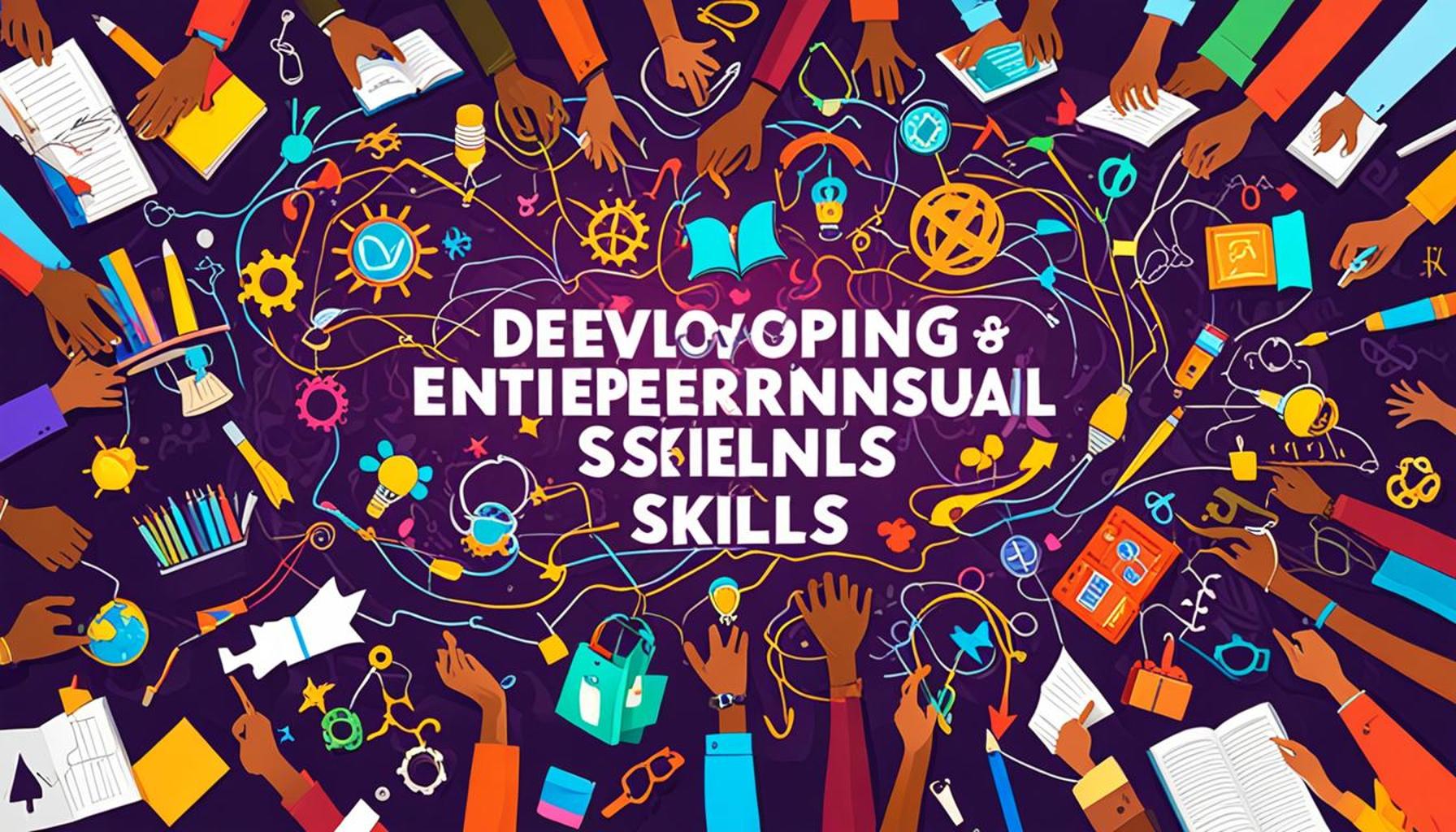Developing Entrepreneurial Skills Through Continuous Learning: Pathways to Success in Nigeria

The Vital Role of Continuous Learning in Nigerian Entrepreneurship
In today’s fast-paced global economy, the demand for skilled entrepreneurs who can navigate the complexities of the market is at an all-time high. Nigeria stands at a pivotal juncture, with over 40% of its population under the age of 15. This demographic reality not only represents a vibrant, youthful workforce but also highlights the urgent need for investment in entrepreneurial education. Continuous learning is emerging as a key strategy for equipping these aspiring entrepreneurs with the skills and knowledge necessary for economic empowerment and development.
One significant advantage of continuous learning is the enhancement of adaptability. Skilled entrepreneurs who actively engage in learning initiatives are better positioned to respond to changing market conditions. The landscape in Nigeria is filled with opportunities, but these are often accompanied by challenges. Thus, the demand for adaptable business models is growing. Some of the essential components that foster this approach include:
- Workshops and Training Programs: These events harness practical knowledge and allow entrepreneurs to connect with peers and industry experts, sharing insights and experiences that are invaluable.
- Online Courses: Platforms such as Coursera and Udemy democratize access to education, enabling Nigerian entrepreneurs to learn from global experts and apply those insights within local contexts.
- Mentorship: Having guidance from seasoned business leaders helps emerging entrepreneurs develop critical skills and build confidence, essential for navigating the often-turbulent journey of business ownership.
Emerging Opportunities in Various Sectors
The entrepreneurial ecosystem in Nigeria is witnessing a remarkable transformation characterized by innovation and resilience. Many young Nigerians are exploring dynamic sectors poised for growth, including:
- Agritech: There is a robust movement towards integrating technology into agriculture, allowing farmers to optimize yield through data analytics and other tech solutions. Startups in this space are addressing food security and enhancing productivity.
- E-commerce: With the rapid rise in internet penetration and smartphone usage, Nigerian businesses are finding new avenues for growth via digital platforms, enabling them to reach broader markets beyond geographical limitations.
- Fintech: Innovative startups are addressing the unique financial needs of Nigeria’s unbanked population, offering mobile payment solutions, microloans, and crowdsourcing platforms that are reshaping the financial landscape.
By embracing targeted education and skill development, aspiring entrepreneurs can seize these burgeoning opportunities, paving the way for personal and national prosperity. As we explore further, we will discuss strategies, resources, and success stories that illuminate the path to enhancing entrepreneurial skills in Nigeria. This journey is not just about individual success; it’s about contributing to a robust economy that can support the dreams of future generations.
ADDITIONAL INSIGHTS: Expand your understanding here
Navigating the Landscape of Entrepreneurial Education
In Nigeria, the journey towards successful entrepreneurship is often navigated through a commitment to continuous learning. This proactive approach allows individuals to not only keep pace with the fast-evolving market dynamics but also thrive amidst competition. Various organizations, institutions, and initiatives are emerging across the country, aimed at bolstering the entrepreneurial spirit through structured learning and resource provision. The synergy between education and practical skills is essential in shaping future leaders who are equipped to tackle both local and international challenges.
Access to quality education remains a hurdle for many entrepreneurial hopefuls in Nigeria. However, recent efforts by the government, NGOs, and private sector stakeholders are shifting the paradigm. To foster a culture of continuous learning, several key strategies are being implemented:
- Skill Acquisition Centers: These centers are popping up in various states, offering vocational training in fields such as carpentry, tailoring, digital marketing, and more. They provide hands-on experience, financial literacy programs, and access to small capital across demographics, particularly targeting the youth.
- University Partnerships: Many universities are beginning to embrace entrepreneurship as part of their curriculum, incubating the next generation of business leaders. Collaborative programs with tech hubs and startup incubators expose students to real-world challenges and foster innovation.
- Government Initiatives: Programs like the N-Power and the Youth Entrepreneurship Support (YES) initiative aim at empowering youths with skills and providing them with the tools to launch startups. These programs often include training that is both theoretical and practical, ensuring participants have a comprehensive understanding of business operations.
Real-World Application of Knowledge
The importance of applying learned skills in real-world contexts cannot be overstated. Nigerian entrepreneurs are increasingly participating in networking events and industry conferences, providing spaces for collaboration. For instance, events like the TechPoint Startup Assembly and Social Media Week Lagos offer platforms for entrepreneurs to gain visibility and showcase their innovations while learning from others in their fields.
Engaging with mentors who have traversed the entrepreneurial landscape adds a layer of depth to the learning experience. These mentors can offer personalized advice, encouragement, and critical feedback that is integral for personal growth and business development. Emerging entrepreneurs are discovering that building networks, sharing knowledge, and receiving guidance from established leaders can vastly shorten their learning curve.
Through these combined efforts, it is clear that continuous learning is not merely a necessity but a transformative pathway to success for entrepreneurs in Nigeria. This evolving landscape encourages young business leaders to adapt, innovate, and grow, thus fostering an environment where entrepreneurial skills can flourish amidst the challenges and opportunities that lie ahead.
| Advantage | Description |
|---|---|
| Enhanced Skill Set | Continuous learning allows entrepreneurs to acquire new skills that are essential in a rapidly changing business environment, improving their competitiveness. |
| Networking Opportunities | Engaging in learning programs often provides access to a network of like-minded individuals and professionals, enhancing opportunities for collaboration and mentorship. |
| Innovation Cultivation | Entrepreneurs are more likely to generate innovative ideas and solutions when exposed to diverse knowledge sources and perspectives, fostering business growth. |
| Confidence Building | Continuous learning enhances an entrepreneur’s confidence in their abilities, which is vital when making critical business decisions. |
Investing in one’s education is paramount for entrepreneurs in Nigeria, as it aligns with the nation’s vision for a robust economy driven by innovation. By focusing on developing entrepreneurial skills through continuous learning, individuals not only enhance their personal growth but also contribute to the larger community. This approach ensures a steady influx of ideas and solutions tailored to local challenges, ultimately paving the way for sustainable success. Entrepreneurs who embrace this mindset position themselves to adapt and thrive, irrespective of the ever-evolving market dynamics.
SEE ALSO: Click here to read another article
Leveraging Technology for Entrepreneurial Growth
As Nigeria increasingly embraces the digital revolution, technology plays a pivotal role in enhancing continuous learning for aspiring entrepreneurs. The proliferation of smartphones and internet connectivity has made access to information and resources more achievable than ever. Entrepreneurs can now leverage online platforms and resources to acquire knowledge, connect with like-minded individuals, and grow their businesses. Various e-learning platforms, such as Coursera, edX, and local platforms like Learn Africa and Udemy Nigeria, offer courses tailored to developing entrepreneurial skills.
Moreover, the advent of online networking has created countless opportunities for Nigerian entrepreneurs to engage with a global audience. Social media platforms like LinkedIn and Twitter serve as fertile grounds for relationships to flourish and knowledge to be exchanged. Entrepreneurs can participate in webinars, join online communities, and even engage in mentorship programs that connect them with successful business leaders worldwide. This global perspective not only broadens one’s understanding of entrepreneurship but also brings forth diverse strategies that can be adapted to the Nigerian context.
Innovative Funding Solutions
Access to finance remains a critical challenge for many entrepreneurs in Nigeria. However, the landscape is changing, thanks in large part to innovative funding avenues that encourage startups to thrive. Platforms like Kickstarter and GoFundMe enable entrepreneurs to raise capital through crowdfunding, allowing them to present their projects to a broader audience. This method not only provides financial backing but also serves as a marketing strategy to validate business ideas before launch.
Additionally, local initiatives such as the Bank of Industry loans and the SME Support Fund are designed to provide capital for small and medium-sized enterprises (SMEs). These financial institutions often require entrepreneurs to complete training programs that bolster their management skills, ensuring that funds are allocated to those who are prepared to handle the challenges of running a business. Such initiatives are essential in fostering a climate that supports skill development as entrepreneurs learn the nuances involved in securing and managing funds efficiently.
Encouraging a Culture of Innovation
The dynamism of Nigeria’s entrepreneurial environment is fueled by a culture of innovation. Numerous startup incubators, accelerators, and innovation hubs like Co-Creation Hub (CcHUB) and the African Fintech Foundry are essential to nurturing entrepreneurial talent and innovative thinking. These hubs provide working spaces, mentorship, and resources necessary for launching successful business ventures. They foster collaborative environments where aspiring entrepreneurs can experiment, iterate, and refine their ideas—an essential part of the learning process that cultivates resilience and adaptability.
Furthermore, the focus on local challenges—such as energy shortages, agricultural inefficiencies, and health service gaps—spurs innovation in solutions tailored specifically to Nigeria’s needs. Entrepreneurs who engage in continuous learning and innovative thinking position themselves strategically to drive impactful solutions that not only benefit their businesses but contribute to broader societal progress.
In this context, it becomes evident that the pathways to success for entrepreneurs in Nigeria are diversified and evolving. With the right blend of education, technology, financial support, and innovative environments, aspiring entrepreneurs can harness their passion and creativity to achieve remarkable outcomes.
RECOMMENDED: Check out this similar article
Conclusion: Embracing a Future of Possibilities
In conclusion, the journey of developing entrepreneurial skills through continuous learning is not just a necessity for individuals in Nigeria; it is a vital pathway to success that embodies the spirit of resilience and innovation. As highlighted in various sections, the intersection of technology, innovative funding solutions, and a culture of creativity plays a fundamental role in shaping the entrepreneurial landscape.
Entrepreneurs in Nigeria are no longer limited by geographical boundaries or traditional learning methods. With abundant resources available through e-learning platforms, webinars, and social media networking, they can connect with a global community of innovators and acquire valuable knowledge that informs their business practices. Furthermore, innovative funding avenues open doors previously thought closed, providing budding entrepreneurs the means to turn their ideas into reality.
As Nigeria continues to face unique challenges, the focus on cultivating local solutions ensures that entrepreneurial efforts are not just profitable but purposeful. By engaging with incubators and innovation hubs, entrepreneurs foster environments conducive to experimentation and collaboration, which are crucial in a rapidly evolving market.
The pathways to success for Nigerian entrepreneurs are multifaceted and vibrant. Continuous learning not only enhances individual capabilities but also contributes to building a more robust and sustainable economy. As the narrative of entrepreneurship in Nigeria unfolds, it becomes evident that those who commit to ongoing education and adaptability will not only thrive but also inspire others. Thus, the call to action is clear: let us embrace continuous learning as the cornerstone of entrepreneurial success and drive meaningful change in our communities.


